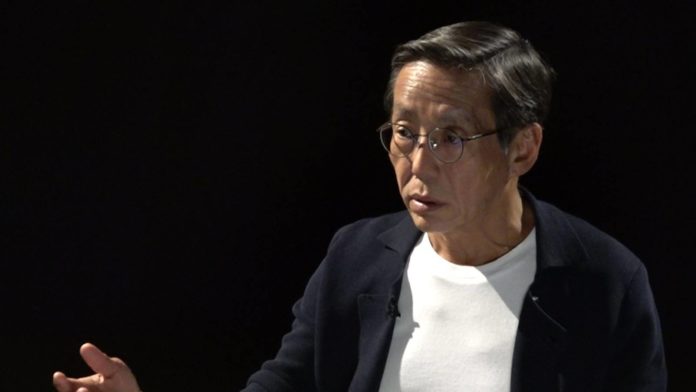SINGAPORE: Ho Kwon Ping has an almost sage-like quality about him and while his pronouncements on businesspeople’s role in solving problems such as income inequality often make the headlines and seem to resonate with the public, I wonder how far he actually walks the talk.
But first, knowing what shapes his thinking is vital.
The 66-year-old is the founder and executive chairman of Banyan Tree Holdings, an international hospitality brand that manages and develops premium resorts, hotels and spas. He is also the founding chairman of the Singapore Management University.
But when he makes news today, it is more often because of his comments on, among other things, diversity within Singapore’s political establishment, democracy, social inequalities and whether Section 377A should be repealed.
His views on such issues, which have been expressed in his public speeches over the years, have now been compiled and published in a new book, Asking Why.
Why, indeed, has a businessman become so involved in intellectual discourse about such a wide range of topics?
“I was actually interested in these areas not for personal reasons, not because I wanted to be a politician. In terms of my interest in world affairs, in politics and economics and so on, it predated my being a businessman. Because that is to me, what drives the world, what drives political tension, what creates wars or creates disparities. At the heart of it all is economics and my interest was therefore in political economy and development economy.”
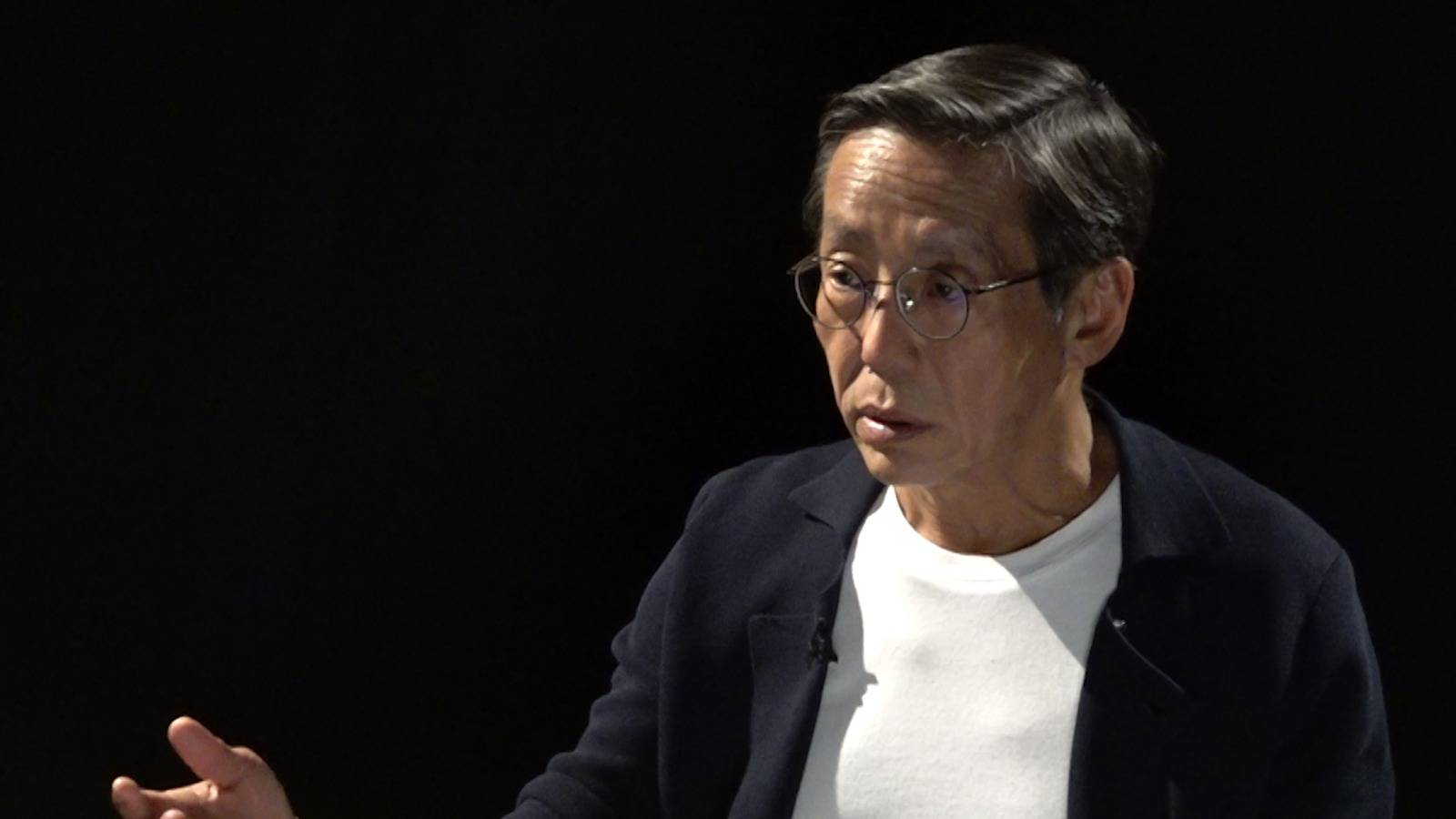
Ho Kwon Ping goes On the Record with Channel NewsAsia.
To listen to the full interview, click here.
WALKING THE TALK?
It’s no surprise then that his views on business also go beyond dollars and cents.
He has said before that he believes business is the most dynamic driver of economic development in the world but it must be tempered and inspired by a determination to improve the world through business.
“You have to recognise that in a non-communist world, it is business that is the main driver of prosperity and change,” he says.
“I have made the further point that business leaders must be social leaders at the same time, because if we are, as business leaders, the main drivers of change, then we must have views on many things other than our own self-interest in business. We must have views on inequalities and climate change, for instance.”
He has walked the talk to some extent. For instance he built desalination plants to turn sea water into fresh water to avoid damaging the fragile ecosystems near Banyan Tree projects.
He also once suggested that investment bankers’ bonuses above six month’s salary be taxed at 70 per cent and the money be redistributed to primary and secondary school teachers.
“It’s about how society values its people. I truly believe that one of the most important groups of people in the world are school teachers. How many of us remember our best primary school teacher and secondary school teacher. I do. You probably realised a lot of things about yourself because maybe a teacher encouraged you and spotted a talent in you or became your mentor while you were young. Teachers really have a far greater job than just teaching knowledge. How they inculcate a generation of people in terms of their values is so important.”
He also speaks up against excessive salaries at the top in general.
“Nobody in the elite world – directors or CEOs – is willing to make practical suggestions to solve the problem. I actually have gone back to that recently at a Singapore Institute of Director’s Conference and people talked about governance. I basically said that it’s so ridiculous for all of us sitting here. We talk about inequality, we talk about how pay scales are skewed and we won’t even do something very simple like in our own companies, adopt a scale, which in fact in the UK they’re beginning to do now, that forces companies to show what the multiple of the CEO’s salary is to the median salary within the company.
“Then it depends on the rest of the civil society to stand up and hold them accountable. I think naming and shaming is ultimately better than regulatory control.”
Banyan Tree Holdings’ own annual reports are online for all to see.
“I’m willing to do it but there’s no point for just me to do it. My multiple is very, very low compared to some other people.”
At one point during our interview, he includes Singapore ministers in this group.
“My salary is decided by the board and my salary is lower than the ministers so I probably belong to the group of people who might be considered mediocre, unfortunately.”
I point out his salary, including benefits and a bonus, according to Banyan Tree Holdings’ 2017 Annual Report was over S$2.5 million, so it’s certainly not lower than ministers’ salaries.
“I don’t know about everything. All I can say is that we are still every year winning corporate awards for our transparency and disclosure. So whatever those guidelines are, we are definitely one of the best. I try. That doesn’t mean you may find me in every way, walking the talk.”
Some might agree that Mr Ho tries more than most. His wife labels him a socialist at heart but a capitalist in his wallet.
One could argue that some of his company’s business practices reflect this.
“When it comes to the hospitality sector, everyone matters. We pay market competitive rates. We’re not a charity so we’re not going to pay more. We pay market competitive rates. We have bonuses. In countries where we charge a service charge, we don’t keep it. We pay it all out to staff.”
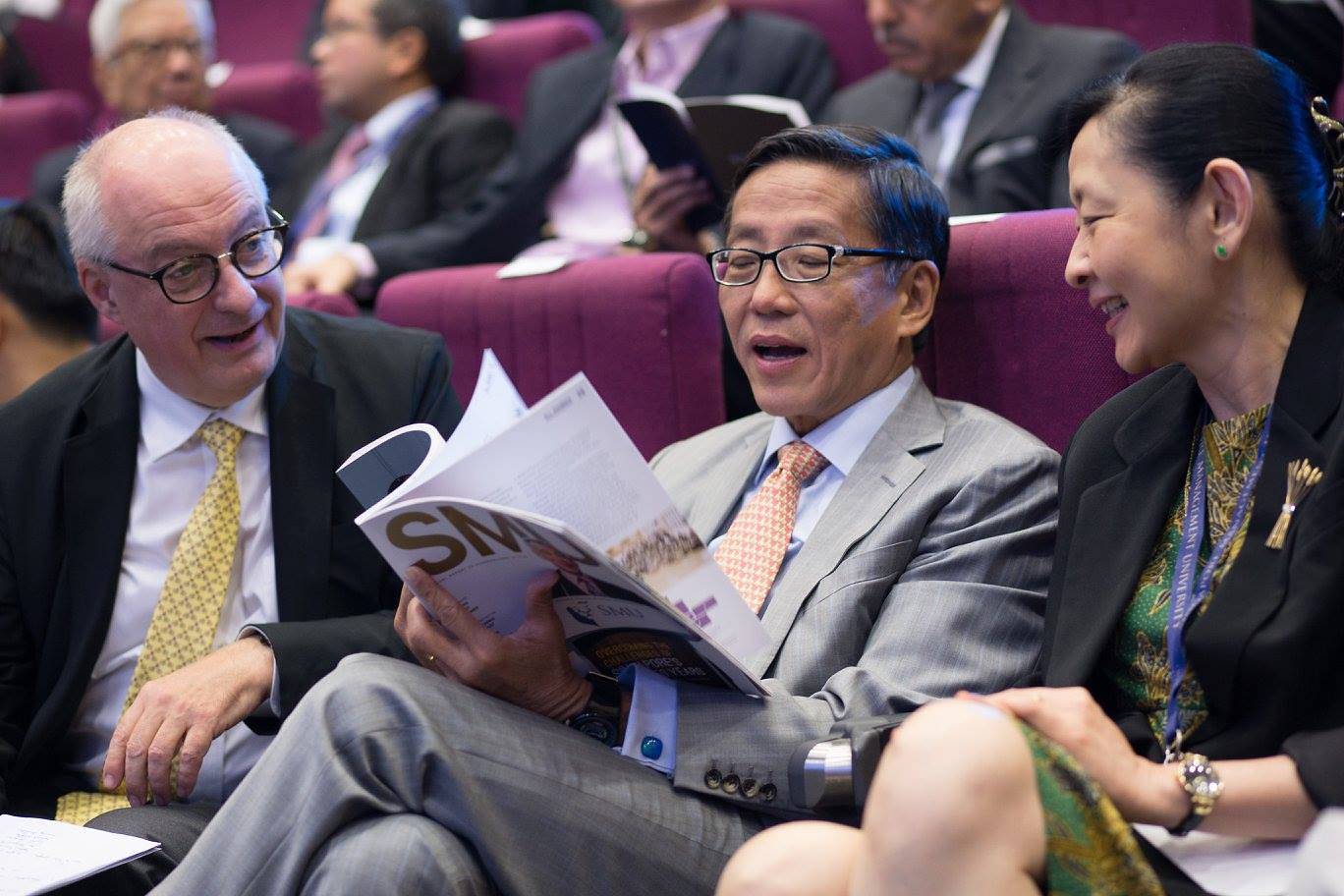
Ho Kwon Ping at the inaugural Institute for Societal Leadership Summit in 2015. (Photo: Singapore Management University)
MINISTERIAL SALARIES SHOULD NOT BE PEGGED TO TOP EARNERS’
We then turn to discussing ministerial salaries since he briefly brought up the issue.
“I think we should peg it to something that is more logical than pegging it to top salaries. When you peg ministerial salaries to the top people in the country, subconsciously – I’m not saying any ministers are doing this – but subconsciously to the extent that in the corporate world, salaries and incentives are supposed to drive behaviour, it motivates ministers to have a more and more unequal society because the more the top get, the more they get.”
He suggests pegging ministerial salaries to the median salary of Singaporeans instead.
“I’m not really concerned about the quantum of the salary, but rather what it is pegged to. It immediately drives the behaviour to the extent that ministers are subconsciously driven – again, I’m not saying they are ever, but to the extent that we all are subconsciously driven – that only when the average salaries go up, then their pay goes up too.”
He suggests “an independent commission of people, very trustworthy, conservative, very pro-Government” decide the actual quantum.
When I ask why they need to be “pro-Government”, he explains he means an objective group that would not bring emotions into the decision and decide based on what’s best for Singapore, not for any one political party.
Some argue that if salaries were lower, attracting the best people to politics would be challenging. He disagrees.
“I don’t think people join politics or become ministers because of the salaries,” he says.
However, he recognises that healthy salaries do play a part in “reducing the incentive for corruption”.
TAXES AND THE RICH
Considering the views he has expressed on the role of wealthy, I wonder how he feels about recent discussions on whether the rich should be contributing more to social spending to meet Singapore’s needs.
“I don’t have an inherent objection to a wealth tax or higher income taxes. I’m not so safeguarding of my own benefits. But any form of tax has to be very carefully studied because sometimes they have perverse effects.
“I separate myself and what I have from what I think is good for the country but I wouldn’t want to pay 99 per cent wealth tax because I think that’s actually not good for the country as a whole. It’s penalising business people. Businessmen are not all just avaricious people who only want to protect what we have. We are also, at the same time, citizens and I would hope that we can separate the two. If something can be proven good for the sake of the country and it involves higher taxes, why not? But at the same time, the other effects need to be considered.”
He also points out that taxing is not the only way to get things done.
“I fully understand that for strategic reasons in the past, we have never wanted to say what our total reserves are and we probably should not but I think they could, at least with some greater discussion internally in the GIC, disclose what they think can be disclosed and maybe have a discussion as to how wealthy we need to be before some of the reserves and the amount that we are earning is channeled back into recurrent spending. Are we building up so much wealth that frankly, Singaporeans aren’t really getting the benefits?”
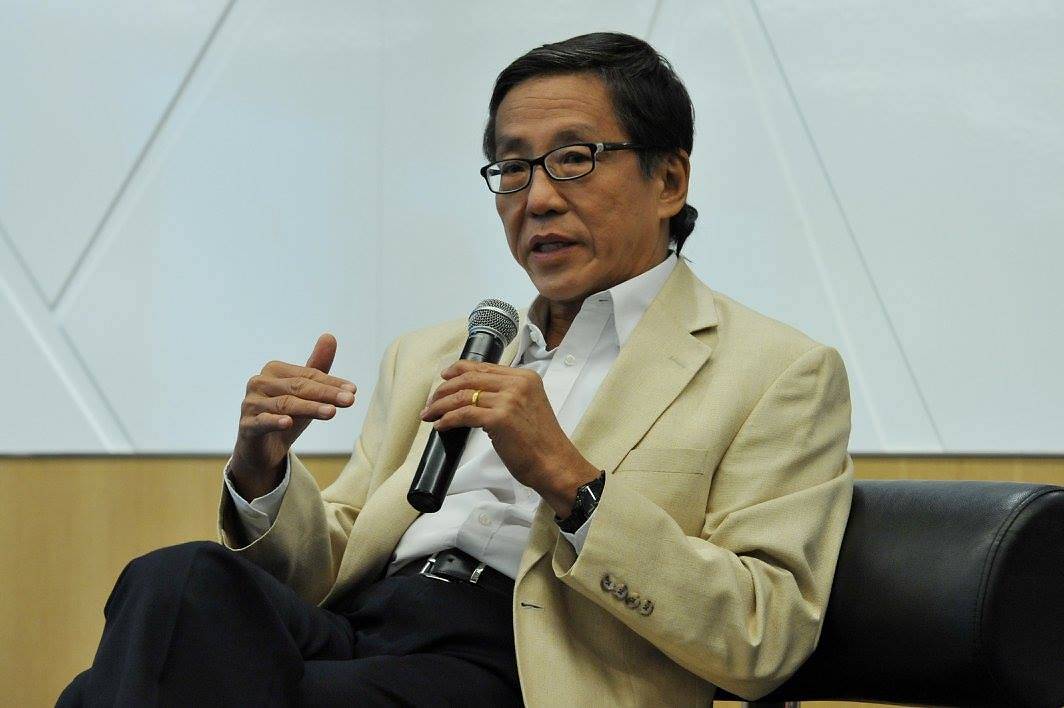
Ho Kwon Ping at a Singapore International Chamber of Commerce event. (Photo: Singapore International Chamber of Commerce)
HIS LIFE SO FAR
We discuss other aspects of his life that he chose to expand upon in his latest book.
Mr Ho was born into a wealthy family. His father, Ho Rih Hwa, was the former ambassador to Thailand, but also ran the family business for a period. Wah Chang Group was a “hotchpoth of companies” spanning areas such as construction and manufacturing that his grandfather created, he says.
He spent a considerable amount of his growing-up years in Thailand because of his father’s diplomatic appointments.
When it came to choosing a profession, he went into journalism.
His articles in the Far Eastern Economic Review criticising Singapore led to him being detained under the Internal Security Act (ISA) in 1977 at the age of 24.
He first explains that it was certainly not the reason he quit journalism. In fact, after his two-month detention, he returned to the industry.
His second stint as a journalist saw him living humbly in Lamma Island in Hong Kong. A journalist’s salary was “extremely modest”, he says.
“That didn’t bother me. But I was getting tired of journalism because it’s non-productive. It’s non-constructive. You haven’t built anything, you haven’t built a factory, you haven’t built something lasting. You’re just writing to deadlines. In my field, one also actually got more credit for criticising things and attacking things than for building up things. If I wrote an article saying the finance minister is doing great stuff in Pakistan, everybody would just fall asleep. If I wrote an article castigating his plan and had the guts to do it, I will be lionised as the guy who is willing to take on the finance minister of Pakistan.”
Having decided to move out of journalism, he accepted a position as an academic, but when his father suffered the first of many strokes, he joined the family business.
After 10 years in the family business, he and his wife began building Banyan Tree. He was a “reluctant businessman” when he joined his father’s business, but the idea of building something of his own inspired him.
While building his own enterprise, he closed many disparate businesses that his father had started “somewhat impulsively”. He explains the twists and turns of this more extensively in his book.
MOMENTS OF DESPAIR
But Mr Ho’s story is no ordinary success story.
It’s also a story “punctuated by moments of despair” as he puts it.
This becomes clear as we discuss his ISA detention.
He was accused of engaging in pro-communist activities.
“I was writing articles that were critical about Singapore. But I didn’t even know all the characters. I didn’t even know any of the people who were supposed to be guilty of this conspiracy. I think I was collateral damage.”
He has said several times that while he thinks “the Government and Lee Kuan Yew were wrong” to detain him because he was not a communist, he does not bear a grudge and it’s clear that the Government didn’t hold it against him either.
“I have worked with Lee Kuan Yew, for him and the Government subsequently.”
Indeed, he has chaired organisations such as Singapore Power and has also served on the boards of GIC, the Civil Service College and the Singapore Tourism Board.
Some have accused him of selling out.
“The concept of selling out is that you have something, a belief perhaps that is so immovable and so fixed, but you’ve abandoned your fundamental principles. But if you are able to differentiate between fundamental principles and those beliefs that you had that were either wrong or which have developed differently over time, I don’t believe it’s selling out.
“I’m still independent in my views. I have been in many ways extremely supportive of certain Government positions, but I’ve also spoken up against certain positions. What got me into trouble in the first place was asking ‘why’ and I continue to ask ‘why’. Having a generally enquiring mind does not mean you have to oppose everything. It also could mean that you recognise that the beliefs that you had in the past are no longer valid.”
In his book, he reveals he was approached by the People’s Action Party (PAP) to consider running as a political candidate in the 1984 general election.
However, after several psychometric tests and interviews, Mr Ho was told that a few members of the party had expressed doubt his political ambitions and his ability to be a team player.
I wonder if he wishes he had got further.
“I think both sides were not very clear. I also had baggage. I came from a family business. What would then happen to the family business? So I too was not at all sure what I wanted to do.”
We return to discussing Mr Lee Kuan Yew.
“I don’t think he ever took the actions he did against communists for his own personal gain. I think he did it rightly or wrongly – in this case wrongly – because of what he felt was correct for Singapore. How can you carry an anger towards somebody who does something for what he thinks is for the good of the country? I believe Lee Kuan Yew just made an error in judgment.”
Mr Ho spent two months in detention. A televised confession was his ticket out.
“They could see I wasn’t a threat.”
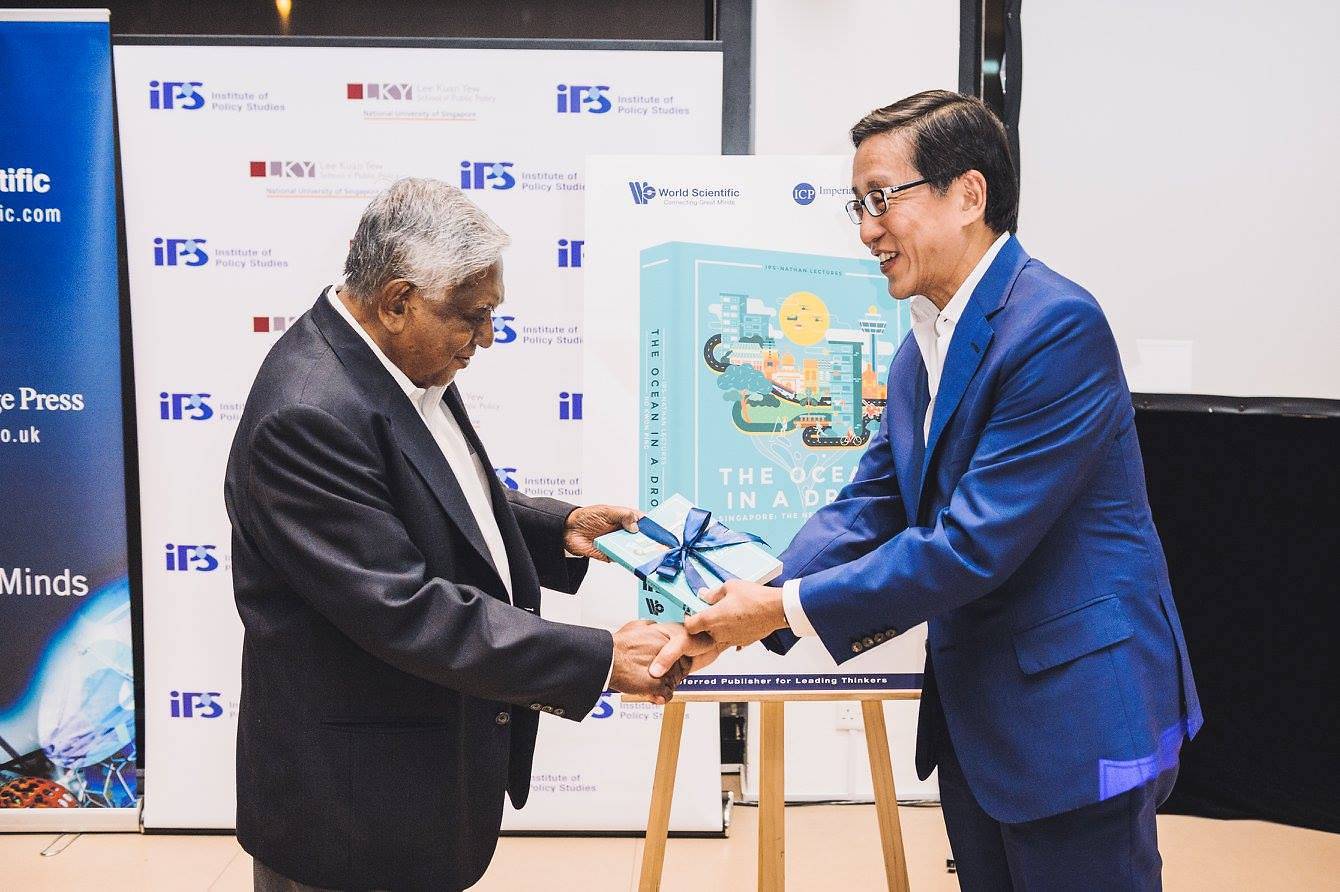
Ho Kwon Ping at the launch of his book, The Ocean in a Drop. He is with the late SR Nathan, former President of Singapore. (Photo: World Scientific)
HE IS NO MANDELA
I ask him why he confessed to something he says he didn’t do.
“I was warned that if you don’t confess you could be in here for 20 years and I don’t think I had the courage nor the conviction of real hardcore activists whether they be Mandela or some of our Coldstore political dissidents. I didn’t have the conviction.”
He harks back to his years at Stanford University where he protested against US involvement in the Vietnam War. He ended up spending a night in jail.
“I think that was probably my first sense of self. I realised one can go through life pretending to be a lot of things that you are not. I came to realise that kind of role playing was partly what I indulged in while in Stanford. It’s a heady life. You’re only in your 20s. You’re a student activist. You’re lionised because you’re one of the only few Asians who’s quite articulate, could speak good English and was speaking out against the war in Vietnam.”
I wonder if he believed in the cause at all.
“I still believe the Vietnam war was a mistake,” he says decisively.
But looking back, he also realised that he did not do so to the extent that he was willing to risk his future.
“I realised this especially during my ISA detention as well. It was a realisation of the need to be really honest with yourself, to know who you are or who you’re not. I was a middle-class kid who had ideals. I was naïve. But I wasn’t a threat to the Government and I wasn’t going to spend 25 years of my life in detention simply because I wasn’t willing to confess.”
He actually watched his televised confession about 30 years later when he served as chairman of Mediacorp. I wonder what was going through his mind as he watched it.
“Duh, this guy at 24?” he says with a laugh.
“I’ve moved on. It’s one of the episodes of my life like many others.”
OPPOSITION POLITICS, CIVIL SOCIETY AND INFORMED DEBATE
While he did not join politics himself, he frequently comments on it.
His past published views include the need for fresh blood and diversity within the political leadership and whether the dominance of a single political party is good for Singapore in the long-term.
“I think Singapore is going into new phases of development where a more creative and liberal approach to what the next generation of Singaporeans want might actually work better,” he says to me.
“A pendulum democracy which changes from one ruling party to another but within the context of two large parties so there is more stability compared with a group of coalition parties, I think is probably the best and most sustainable long-term solution.”
Considering the current circumstances however, can a credible opposition emerge in Singapore?
He addresses the opposition’s concerns over an un-level playing field.
“Every government, to its greatest extent possible, tries to make the playing field un-level. Who wouldn’t? No government is going to give its right to rule on a silver platter to somebody else.”
But he admits that more can be done to level the political playing field here.
“It’s not just about the control over the media. Now you already have social media that is not so easy to regulate. There’s lots of gerrymandering. We could think of the Government doing less of that.
“In the past, one big factor was fear. In the beginning, it was fear of imprisonment if you spoke against the Government. Today, it isn’t that. It’s the traditional fear of even just being chastised publicly. Asians are very thin-skinned and we will always think about face and the minute somebody scolds you, it’s already bad enough. The Government can afford to be less personal.”
But he feels that the fear of speaking up is dissipating anyway.
“People are quite happy to disagree with a minister now. It would be unthinkable in my day. When I was covering Singapore, the only people who would run in opposition politics would be like character actors out of a bizarre play. You would not see people of substance, people with good professional backgrounds, good incomes, articulate and idealistic people running. Now, you are seeing many of them coming up.”
Ho Kwon Ping at the Singapore Management University. (Photo: Singapore Management University)
However, he explains that to him, what’s more important in a vibrant democracy is a robust civil society.
“Civil society is not a very pleasant symphony of harmonic music. It’s a cacophony of people who make up a marketplace of ideas. I think Singapore can afford to have more cacophonic sound because I think if you want to have resilience in society, want people to ask ‘why’ more often so that they can examine issues and come up with solutions to problems, you need that. They have to feel empowered to solve issues and not just rely on the Government. You need people to have a sense of ownership of Singapore.
“For this, one of the first things we need is more access to information. Many people in our universities who want to have access to data find that a lot of Government agencies simply say we cannot give you that data even if it’s not a classified secret. We should have every civil service ministry adopt a pledge, saying that it would only withhold information by exception, meaning everything can be given to the public, except for certain things. Now, it’s the other way around. But we need more information even if some of that data may not point to very flattering things about Singapore society, so that we can have more informed debates.”
One particular debate that seems to be concerning him these days is the one over Section 377A which he mentions several times during our interview.
“This is one area where I think we can speak about with a better understanding of the issues. I agree fundamentally with what diplomat Tommy Koh and some others have said – that you have to differentiate between a sin and a crime. My personal view is that I don’t think homosexuality is a sin at all. Others may say it is a sin, but I would say that does not even relate to this debate at all. Adultery is a sin but it’s not a crime. Divorce may be a sin, but it’s not a crime.
“It’s also an untenable law. We’ve got something which is on the statute books as a crime and the Government is saying it won’t act on it. Former attorney-general Walter Woon has said that makes a mockery of the law. I hope the Government would just take that to heart and simply say, we are not taking sides on whether homosexuality is a sin or not. That’s to do with taboos and moral values. Section 377A is about the legal system in Singapore.
“Should it be a crime? We have to divorce the law from morality.”
At 66, Mr Ho clearly hasn’t mellowed when it comes to expressing his views.
As we end our conversation, I ask him what he would like to be remembered for.
“I’ve never even thought about why I should be remembered for anything. I think it’s much more important to think about what you are going to do with the remaining years of your life. For me, that is to continue to have a purpose. It’s continuing to do what I’m doing and whatever comes along the way.
“I joke that I’ve only lived two-thirds of my life. I’ve got 33 more years because I’m only going to die at 99. No earlier than that. So I’ve got 33 more years to find myself,” he says with a laugh.
